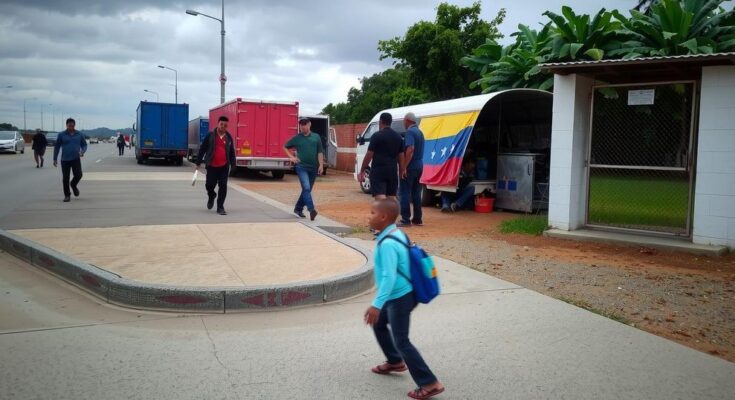The influx of Iranian nationals with falsified documents in Colombia raises security concerns amid strengthened Venezuela-Iran ties. President Maduro’s re-election celebrations showcased this alliance. Key figures like Alex Saab bolster cooperation in military and economic sectors, while Hezbollah’s presence in Venezuela complicates regional stability as both nations circumvent international sanctions through strategic partnerships.
In recent weeks, there has been a notable increase in the appearance of Iranian nationals in Colombia with allegedly forged passports linked to Venezuela, raising significant security concerns among Latin American officials and Western diplomats. This influx occurs against the backdrop of Venezuelan President Nicolás Maduro’s contentious re-election celebrations, during which Iranian representations were prominently featured, symbolizing the strengthening ties between Iran and Venezuela. Maduro’s acknowledgment of Iran and his enthusiastic shout of “Long live the Islamic Republic of Iran” during his speech illustrate this geopolitical alignment and support for the Iranian leadership.
Iran’s government has formally expressed support for Maduro’s presidency, reinforcing commitments to enhance cooperation against what they describe as unilateral U.S. sanctions. Iran stands alongside Russia, Cuba, and Nicaragua, key international allies of Maduro, particularly in light of growing isolation following internationally criticized elections. Recent developments, including the return of Alex Saab, a Colombian intermediary tied to Maduro, who was released from U.S. custody, have further accelerated collaboration between the two nations.
Colombian immigration authorities have identified a troubling trend where Iranian individuals utilize counterfeit Greek documentation while attempting to travel, likely aiming to exploit Colombia’s extensive travel network. Notable incidents include the interception of three Iranian nationals with sophisticated forgeries at Bogotá’s El Dorado International Airport, reflecting alarming levels of organization potentially involving state-level entities. Furthermore, defense experts indicate that Venezuela and Iran are enhancing military cooperation, including initiatives focused on drone technology and the establishment of Hezbollah operational centers within Venezuelan territory.
The deepening relationship between Venezuela and Iran extends beyond military and migration concerns, incorporating economic collaboration as well. Regular flights operated by Mahan Air facilitate a gold-for-oil trade between the two sanctioned countries, effectively circumventing international restrictions. Recent agreements also signify expansive bilateral cooperation across various sectors, emphasizing a continuous strengthening of ties since the administration of former President Hugo Chávez.
Amidst these developments, Iran’s ambassador to Venezuela has played a crucial role in intensifying cooperation in technology, defense, and energy. The ongoing connections, particularly facilitated by figures like former Oil Minister Tarek El Aissami, who has been linked to Hezbollah infiltration, complicate the regional security landscape and pose significant challenges to Western policy-makers amid increasing global geopolitical shifts involving Russia and China.
The growing Iranian presence in Latin America, particularly in Venezuela, reflects a broader trend of geopolitical shifts where countries such as Iran, Russia, and China seek to extend their influence. Venezuela, under Maduro’s leadership, has cultivated close ties with Iran amidst economic sanctions and international isolation, showcasing a strategic partnership formed in response to mutual adversities faced from Western nations. These developments have raised alarms regarding regional stability and security, given the historical affiliations between such nations and illicit activities, including arms and drug trafficking.
In conclusion, the increasing Iranian presence in Venezuela, coupled with the emergence of counterfeit passport operations and military cooperation, presents a multifaceted threat to regional stability. The actions of Venezuelan leaders to solidify ties with Iran, amidst support from allies like Hezbollah, underscore a collaborative effort to counter US influence. With bilateral agreements spanning significant sectors, the implications of this relationship will likely continue to unfold, posing complex challenges for both Latin American security apparatuses and Western policymakers.
Original Source: www.intellinews.com




